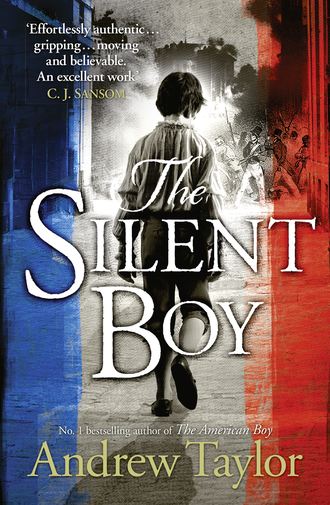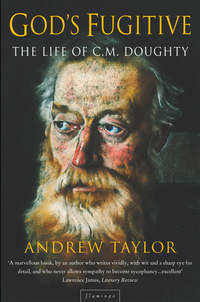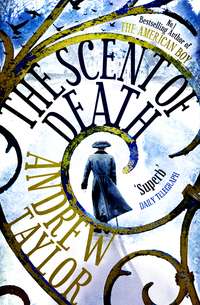
Полная версия
The Silent Boy
The path parallel to the wall is fifty-two paces on its two long sides. It is thirty-four paces on one of the shorter ones, and thirty-two paces on the other – which worries Charles because it means that the garden cannot be a perfect rectangle and he will find it hard to calculate its area. He knows how to calculate areas, but only if they form exact squares and rectangles. A further complication is that he does not know exactly how long his paces are.
He has all these numbers in his head, and he scratches them on the gravel to help him remember. But they are just that – numbers. They don’t tell him other things. They float like clouds, unattached to anything solid.
In his frustration, Charles kicks the low wall around the pool and hurts his foot. The water is green and covered with weeds and insects that play on the surface as if it were a sheet of glass. Neptune is reflected in the water, sneering up at him.
Charles picks up a handful of gravel and throws it into the pond. The smooth glass shatters. The reflection of Neptune disintegrates.
There, he thinks, that will teach you to hurt me.
That is when he hears the footsteps.
Charles turns. The gardener’s boy has come into the garden. He walks slowly along the wide alley that runs down the middle of the garden towards Neptune and his pond.
The gardener’s boy stares at Charles. His face is very serious. His lips are moving slightly. Charles wonders if he is trying to multiply big numbers in his head, perhaps calculating the number of stockings and shirts in his baskets. There are still red weals on his cheek from the beating.
The boy stops just before he would bump into Charles. He scuffs at the numbers in the gravel, obliterating the facts they record. His face is dirty. He has freckles that make it look dirtier. Words pour out of his mouth in his thick, soft, shapeless voice.
‘Goddamned foreigner, you can’t even speak, you’re a baby, you piss in your bed, you’re a windy great looby, you skinny ballocks, you stinking Frog noodle …’
He says the words over and again, like a prayer. The more he says, the angrier he becomes.
He takes Charles’s left ear by the lobe. He pinches it. Charles opens his mouth and a scream comes out, a high, wordless sound like a small animal in pain. The boy does not let go. Charles tries to hit and kick him but the boy holds him at arm’s length.
There is a spark in the boy’s green eyes. He drags Charles’s head backwards. With his other hand he turns Charles around. He forces him to his knees. He bends him over the parapet of the pool.
The stone coping digs into Charles’s ribs. The gardener’s boy pushes Charles’s head slowly towards the water.
The sun is reflected in its surface. He closes his eyes. The pain in his ear fills his head with white noise.
With his free hand the gardener’s boy pins Charles’s body to the parapet.
The water is cool and as soft as a silk dress. Charles opens his eyes. A fish slips away into the murky depths. He opens his mouth to scream. He swallows water.
The grip on his ear drags him down and down. His legs flail. The pain in his chest is now worse than the pain in his ear. Then pain has no borders. It goes everywhere.
In an instant Charles remembers how he saw a man drown a litter of kittens in the yard when he was very small. The man put them one by one into the bucket of water and held them under the surface. The kittens’ legs kicked. The bodies writhed. When there was no more movement, the man took each scrap of dripping fur from the water and laid it on the ground where it lay perfectly still. Then he reached for another kitten, and soon they were all dead. Sodden scraps of flesh and fur.
While Charles is drowning, in the middle of all the pain, he sees this bucket quite clearly. He sees the man’s hand and remembers how the back of it was covered with black hairs. He sees the head of a drowning kitten between his fingers.
Then, as suddenly as it began, it is over. Charles is dragged out of the water and thrown to the ground, where he lies, panting and dribbling.
Slowly the white noise and the pain diminish. Charles coughs. He hears the boy’s running footsteps.
Charles retches – at first weakly and then with increasing violence. Dirty water spews out of his mouth and splashes on his face and hands.
That night Charles wets the bed again.
He doesn’t know why this shameful and babyish thing should happen: it just does. This is the first time that he has been caught wetting the bed since they came to England.
When the maid discovers that he has wet the bed, she calls the housekeeper, who is very stern, very English. Her name is Mrs Cox and she has a voice that sounds like chalk scratching on a slate.
Mrs Cox shakes her head and says to the maid that the boy is a dirty, devilish imp, and what can you expect of these foreigners? This one can’t even speak his own language.
The maid says maybe he’s a simpleton, like the girl in the village who looks like a monkey and cannot keep herself clean.
Mrs Cox replies that in any case the boy should be whipped to beat the nonsense out of him.
For some reason Charles thinks of the way Marie used to beat the dust from the carpets in the backyard of their lodgings in Paris. In the middle of his fear, he has a picture in his head of himself draped over a fence, with Mrs Cox and the maid on either side of him, beating him with carpet beaters so that the wickedness flies out of him in puffs of evil. He thinks Mrs Cox would enjoy that, and probably the maid too.
But the housekeeper is not quite sure of her powers. She says she will speak to Monsieur de Quillon’s valet, who has some English, and ask him to speak to his master.
Charles waits all day for the blow to fall. But nothing happens. Not that day, nor the next, nor the one after.
Every night he prays on his knees to God that he will not wet the bed again.
Sometimes God listens. Sometimes he doesn’t.
Chapter Ten
Savill’s daughter, Lizzie, had lived with her aunt and uncle in Shepperton, on the Thames, from the time that she was little more than a baby until the death of her uncle.
That melancholy event had been two years ago. Afterwards, Savill had brought his sister and his daughter to Nightingale Lane. The freeholds belonged to a widow in New York, who stubbornly refused to sell them, though he had forwarded several offers to her. There were four houses in the lane, and he had the largest, which had a garden with a small orchard.
The builders were at work all around, raising new houses in new, neatly proportioned streets. Most of the land around was owned by the Duke of Bedford, apart from a rectangular enclave north of Great Store Street where the City of London held the freeholds.
Nightingale Lane was squeezed between the Duke’s estate and the City’s land, a tiny kink in the pattern, an outrage against the principles of rational design and commercial good sense. But sometimes, early in the morning, before the builders started work and the streets filled with traffic, Savill heard the birds singing their laments in his garden, singing for lost fields and ruined hedgerows.
It was the first time that he and Lizzie had lived under the same roof for more than a few months. It healed a wound he hardly knew he had until it began to scab over.
In the past, he had missed his daughter more than he cared to admit, even to himself. When she was seven, he had commissioned an artist to paint a miniature of her, which he had had framed and enclosed in a square case, bound in green leather, now faded and much worn. He had kept it on his table or by his bed, standing open. It had been a poor substitute for a flesh-and-blood child, but it had been better than nothing.
On the last Saturday in September, more than a week after Savill’s second visit to Mr Rampton’s house in Stanmore, he came home from the City to find Lizzie in the parlour, waiting to preside over the tea table.
‘You look fatigued,’ she said in a severe voice.
He kissed her. ‘Where is your aunt?’
‘Drinking tea with Mrs Foster and admiring her grandchildren, especially the new one. But why are you looking so stern, sir?’
‘I shall tell you directly.’
‘You shall tell me nothing until you have sat down in your armchair and we have rung for hot water.’
She would not let him say what he wished to say until the water had been brought, the tea measured out, and the infusion was brewing.
‘Well, sir, you may speak,’ she said, folding her hands in her lap and looking at him with a sort of mock gravity that usually made him laugh.
‘I was obliged to go out of town the other day and see your Uncle Rampton,’ he said.
She made a face. ‘Nothing disagreeable?’
‘Not for you, I hope.’
‘I think he must be an odious man. He does nothing for you.’
‘My dear,’ he said. ‘I’m afraid there’s news of your mother.’
At once the cheerfulness left Lizzie’s face. She raised her hand to her mouth as if holding back the words that were trying to get out. Savill knew that she barely remembered her mother, who had absconded when she was very young; and, even before that, she had seen little of her, for in those days Augusta had not been much troubled by maternal feelings.
‘She’s not here?’ Lizzie blurted out, the colour rushing to her cheeks. ‘Not in London?’
‘No. My dear, you must prepare yourself for a shock. I am sorry to say that your mother is dead.’
Lizzie’s face puckered, as if age had prematurely withered it. ‘Oh. I – I see.’
‘She died in Paris.’ Savill leaned forward and took his daughter’s hand, which lay limp and warm in his. ‘Mr Rampton said it was very sudden. I do not know the details yet, but I shall in a week or two.’
‘I don’t know what to say, Papa.’
‘You don’t have to say anything. Nothing is changed – not for you – not for me.’
She raised her head suddenly. ‘But it has. For you, at least. You can marry again.’ Her colour deepened. ‘That is to say, should you wish to.’ She sat up very straight and turned away to busy herself with the tea.
Savill was seized by a desire to laugh. He said gravely, ‘I have no intention of marrying at present. Besides, you must not worry about me. Or about your mother.’
‘But I don’t know what to feel,’ she said in a voice that was almost a child’s wail.
‘You don’t have to feel anything, my love.’
‘Will we go into mourning?’
‘Perhaps not, in the circumstances.’ He rubbed his scar, which had begun to itch. ‘I will consult your aunt – she will know what is proper. But first there is one other thing you must know.’
She looked down at her lap and did not speak.
‘After she went away, your mother had a child. A son. He is still alive.’
Her head jerked up. ‘I have a brother?’
‘Yes. A half-brother.’
‘Why did you not tell me before?’
‘Because I did not know myself until I saw your uncle Rampton.’
‘How old is he?’
‘Ten or eleven, I believe,’ Savill said.
‘A half-brother,’ she repeated. He watched her calculating the arithmetic. ‘So – who was his father? I – I’m sorry, perhaps it is indelicate of me to—’
‘It is natural that you should ask. But I’m afraid I cannot tell you that either, because I do not know. Perhaps I will find out when I see him.’
‘Is he here? In England?’
‘Yes. Not in London, though.’
‘When shall we see him? Where will he live? Will he live with us here?’
‘I expect you will see him at some point, but I do not know quite when. As for where he will live, Mr Rampton has a fancy to adopt him. If he does that, I dare say the boy would live with him, except when he is at school, and so on.’
‘But he should live with us, Papa.’ Colour flooded over her face. ‘If he’s my brother, I’m nearer kin to him than Mr Rampton.’
‘True. But Mr Rampton can give him things that we cannot give him.’
She forced him to stop again. ‘It is not that you don’t want him, is it? Because he – he’s not your son?’
‘No …’ Savill hesitated. ‘Or rather, I do not think so.’
‘What is his name?’
‘Charles.’
‘Charles,’ she repeated, as if turning the name over in her mind and examining it from every angle. ‘Charles. Where is he living now? Who is looking after him?’
‘In England, at the house of a French gentleman, the Count de Quillon, who was obliged to leave his country because of the Revolution. Which is another complication. The Count had a kindness for your mother and, for her sake, he wishes to keep Charles with him and remain his guardian.’
‘But surely you would not let them take him from us? Either this Count or my uncle Rampton?’
‘The poor boy is alone in the world, and orphaned. He does not know us at all. I wish to do what is best for him, not for us.’
There was a silence.
‘Will you pour the tea?’ he said.
She obeyed mechanically. But as she passed him his cup she looked directly at him.
‘Will you ask him about my mother?’ she said. ‘Will he tell you who his father is? Do you think he knows?’
‘I don’t know,’ Savill said. ‘I don’t know anything except that he’s your mother’s son and his name is Charles. And I shall go down to Somersetshire next week to fetch him.’
Chapter Eleven
The house in Crown Street was one of a gently curving terrace. The building had been newly refaced and refurbished. It must once have been a private residence but, like so many of its neighbours in the vicinity of the Palace of Westminster, it had gradually become a government office.
Savill mounted the three shallow steps up to the front door. At his knock, a shutter in one of the door’s upper panels slid open. Savill glimpsed a fat finger that lacked a nail. He gave his name and asked for Mr Rampton.
After a pause, he heard the rattle of a chain within and the grating of bolts. The door opened, revealing a vast porter whose bulk filled most of the height and width of the narrow hallway. He was as tall as a Potsdam grenadier but far wider. His barrel of a body balanced on tapering legs that seemed too thin and fragile to bear its weight.
Beyond him was an inner door. Breathing heavily through his mouth, for his nose was a flattened ruin, he studied Savill and then consulted a sheet of paper in his hand. He looked up. ‘You’re to go in,’ he said in a combative tone, as though Savill had expressed a wish to do otherwise.
The porter rapped twice on the inner door. As he did so, Savill glimpsed the palm of his right hand, which was disfigured by a broad welt or burn.
There was the rattle of another bolt. The inner door opened. A grizzled, whippet-thin clerk took Savill’s name and business without comment. He waved him into a room on the left of the passage, where two other clerks were at work. The office was divided by a tall wooden partition into unequal parts. In the larger part, nearer the fire and the window, were the clerks’ high desks. In the smaller part were four dirty wooden chairs for visitors and a row of hooks.
‘I dare say Mr Rampton will see you shortly,’ the clerk muttered.
He retired behind the partition, where he pulled a handle in the wall by the fireplace and clambered on to his stool. Savill heard the ping of a distant bell. He sat, his face impassive, while the three clerks took turns to peer over the partition at the visitor. As soon as he met their eyes, they looked away.
Five minutes passed, perhaps ten. There were footsteps on the stairs and Malbourne came into the office. He was no longer wearing the black-silk sling.
‘Mr Savill, sir, your servant. I beg your pardon for keeping you waiting. Mr Rampton’s quite at leisure now and begs you to step up.’
‘What is this place?’ Savill asked as he climbed the stairs.
Malbourne glanced over his shoulder. ‘We are part of the Post Office, sir.’
A clock ticked on the first-floor landing and the brass door furniture shone. Malbourne led him into an office overlooking the street and tapped on an inner door. Rampton’s voice cried ‘Enter’.
The room beyond was large, airy and comfortably furnished. Only a large table set along one wall hinted that business was transacted here. It held bundles of letters tied with pink ribbon, some of them sorted into flat, rectangular baskets.
Savill bowed to Mr Rampton who, with great condescension, rose from his chair behind his desk and inclined his head in return.
‘How obliging of you to call,’ Mr Rampton said, as if this was no more than a casual meeting. ‘Shall Malbourne send out for something? Is it too early for a glass of sherry?’
‘Not for me, sir, thank you.’
‘You may leave us, Horace. Close the door, but hold yourself at readiness in case I need you.’
Malbourne bowed and withdrew. He closed the door but Savill did not hear the snick of the catch engaging.
Rampton waved Savill to a chair beside his desk. ‘Tell me, how does Miss Elizabeth do this morning?’
Savill said she was very well and added that his daughter would be most gratified to hear that her uncle Rampton had been enquiring after her.
Rampton nodded impatiently. ‘I take it that you have not had second thoughts about our agreement?’
‘No, sir. As you may recall, I have committed myself merely to—’
‘Yes, to be sure we are quite clear about where we both stand.’ Rampton opened a drawer and took out a small packet. ‘For my part, I have not been idle since we last met. I directed my attorney to write on your behalf to the Count, informing him that you, as my poor niece’s husband, propose to call on him at Charnwood to collect the boy and the necessary papers. My name does not appear, of course. The Count should have received the letter by now.’
The top of Rampton’s desk was almost empty – it was a fad of his, Savill remembered, to keep the desk he worked on as clear as possible. He broke the seal that secured the outer wrapping of the packet. He took out two sheets of paper.
‘This one confirms who you are,’ he said, ‘and this one is an attested copy of the marriage certificate of my poor niece and yourself.’ He put down the papers and took up a third. ‘Are you familiar with the terms of the new Police Act? No? Well, I suppose there’s no reason that a law-abiding citizen need be. One of the provisions of the act was to set up police offices and appoint stipendiary magistrates. Foolish people always assume that such measures constitute a mechanism for government to suppress the liberties of individual citizens …’
‘Are they wrong?’
‘Of course they are. Our police have a particular task, and only one: to prevent revolution. One of their magistrates, Mr Ford, has provided you with this warrant: it gives you the authority to enter Charnwood Court and remove the boy Charles into your keep. I hope it will not be necessary for you to use it, but there is no harm in your being prepared.’
Savill watched the papers multiplying on the desk. He felt stirrings of alarm. Attorneys? Magistrates? Police offices?
Rampton picked up another document. ‘Now, you should not need this but it will serve to introduce you to a local justice as a representative of the police office. Mr Ford requires him to give you any assistance you may need. In case of emergency, he appoints you under the Police Act as his agent or deputy, which gives you temporary powers of inquiry, arrest and detention, subject of course to his confirmation.’ He looked at Savill and his hand fluttered as if shaking drops of water from his fingers. ‘Again, just in case.’
‘Surely this is quite unnecessary, sir?’
‘Almost certainly it is,’ Rampton said. ‘But the Government believes these are dangerous people. One should take nothing for granted.’ The fingers fluttered to alight upon another sheet of paper. ‘Say, for example, you should desire to communicate with me while you are at Charnwood. Do not write to me here or at Vardells. Address the letter to Frederick Brown, Esquire, at the White Horse Cellar in Piccadilly, to await collection. I have made a memorandum here.’
Savill said, ‘Who is Mr Brown?’
‘There is no Mr Brown, as such. He is a convenient fiction. I must emphasize that my name must not appear in this in any way. It would be prejudicial to the Government.’
‘Why, sir?’
‘I’m afraid I am not at liberty to say.’ Rampton smiled across the desk. ‘Now – this is an inside ticket to Bath, on the mail diligence. I understand that Charnwood is fifteen or twenty miles from the city. You will have to hire a conveyance to take you on to Charnwood. And perhaps on your way back with the boy, you will find it easier to hire a chaise at Bath and travel post up to London.’
Rampton unlocked another drawer and took out a small canvas roll. He placed it on the desk, where it lay like a grey sausage.
‘Fifty guineas in gold,’ he said. ‘You must sign for it, of course, and we will require a full account of any monies you disperse. The sum should be ample, but in case of emergency here is a letter to Mr Green of Green’s Bank in Bath. It will authorize you to withdraw further funds. But I do not think you will need to trouble him.’
Savill took the papers and looked through them. Rampton pushed pen and ink towards him. Savill signed receipts for the money and the papers. He stowed them both in an inner pocket. He felt the weight of the gold dragging him down.
‘There’s more to this than the boy,’ he said.
‘I beg your pardon?’ Rampton said. ‘I don’t follow you.’
‘All this. The money. This deed. The warrant. Your Mr Brown.’
‘My dear sir, you are allowing your fancies to run away with you.’ Rampton sat back and stared at Savill. Then, unexpectedly, he smiled. ‘I have been quite candid with you. I want to restore Charles to his family. I want to bring him up as my heir. All these precautions are necessary solely because of the peculiar nature of his present guardians – and, indeed, the delicate nature of my own employment. Is all this so very strange?’
‘Pray, sir,’ Savill said, ‘what exactly is the business of this office?’
‘What? Oh, there’s no mystery about that. We are a sub-department of the Post Office. We are known as the Foreign Office, or the Black Letter Office, because we handle the foreign mails.’ Rampton rang a bell on his desk. ‘While you are here, it may be helpful for you to hear a little more about Charnwood.’
Malbourne entered the room. He inclined his head. ‘Sir?’
‘Charnwood Court, Malbourne – who owns the freehold?’
‘A lady named Mrs West, sir, the widow of the brewer. She resides at Norbury Park, I believe, when she is in the country. Charnwood is a house on the Norbury estate.’ Malbourne cleared his throat. ‘When she was in town in the spring, she was often seen in the company of Monsieur Fournier. In fact, I believe it was he who arranged the tenancy, and it is his name on the lease.’
‘That backsliding priest,’ Rampton said. ‘A traitor to his God as well as to his king.’
‘Yes, sir. He arrived in England after the massacres in September. I believe he took the lease for Charnwood in the spring, which suggests he is remarkably far-sighted. He declines to call himself an émigré, however.’
‘In other words, he’s sitting on the fence,’ Rampton said. ‘Waiting to see what happens with the King. Besides, most of his wealth is in France and he doesn’t want to lose it if he can help it. But he’s a clever devil, Savill – if he’s at Charnwood, he’s a man to watch.’
Malbourne cleared his throat. ‘And a charming devil, sir, as well. Monsieur Fournier is a man of great address and he is very adroit at worming his way into intimacy with those who he believes may further his interests.’
‘What if Mr Savill needs to summon a magistrate to enforce his claim?’
‘He should communicate with Mr Horton, sir, the Vicar of Norbury. He is the nearest Justice now. The village is less than a mile from Charnwood.’








